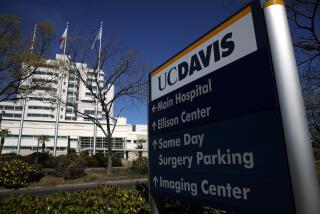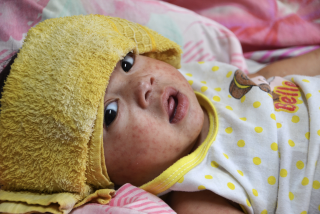Rubella Birth Defect Prevention Found Lax
- Share via
More than half the cases of birth defects that resulted from a German measles outbreak in Southern California in 1990 could have been prevented had health-care providers and others followed federal rubella-screening guidelines, a study has found.
The study, published today in the Journal of the American Medical Assn., found that 12 of 21 women who delivered babies with congenital rubella syndrome had missed earlier opportunities to be screened and vaccinated against rubella virus infection.
Some were never screened before marriage, though it is required by state law in most cases. Others went unscreened during previous pregnancies. Some were not screened or vaccinated at abortion clinics or in hospitals after delivering an earlier child.
“Each time women (of child-bearing age) come in contact with the health-care system in any setting, they should be asked about their immunization status,” said Dr. Susan Lee, who headed the study. “People don’t do that. Everybody thinks someone else is responsible.”
Rubella, or German measles, is serious only when it affects a woman in the first half of pregnancy. If it infects the fetus, it can cause serious birth defects including deafness, congenital heart disease, mental retardation, cataracts and cerebral palsy.
As a result, federal health authorities recommend, but have not required, that women of child-bearing age be screened before getting a marriage license, during prenatal care, in abortion clinics, in family-planning clinics and before admission to schools.
If a woman tests negative for protective antibodies to the virus--suggesting she has never been exposed and therefore is not immune to infection--she is to be referred for vaccination. Vaccination is not done while a woman is pregnant because of the risk of infection but can be done immediately afterward.
Thanks in part to such screening, the incidence of congenital rubella syndrome in the United States dropped to an all-time low in 1985 and appeared to be on the verge of elimination. In 1989, only two cases were reported nationwide.
But an outbreak of rubella in Los Angeles, Ventura, Orange and San Diego counties in 1990 resulted in 23 reported cases of babies born with the syndrome.
In the new study, researchers from the U.S. Centers for Disease Control and the Los Angeles County Department of Health Services examined 21 of the syndrome cases to determine why the mothers had not been screened and vaccinated before becoming pregnant.
In the other two cases, they had become infected before immigrating to the United States.
The researchers found that 12 of the women had a total of 22 missed opportunities for rubella screening or vaccination, including at the time of marriage, during previous pregnancies, during induced abortions and after previous births.
Nine of the women had no known missed opportunities. Those included women who were never married, had common-law marriages or were married abroad, and women who entered school in California before the 1980 law making rubella vaccination a condition for admission.
“We need more postpartum vaccination of women before they leave the hospital,” said Donnell P. Ewert, a county health department epidemiologist and co-author of the study. “(And) abortion and family-planning clinics really need to get on the ball and provide this service for their clients.”






